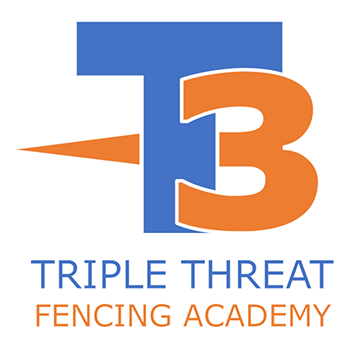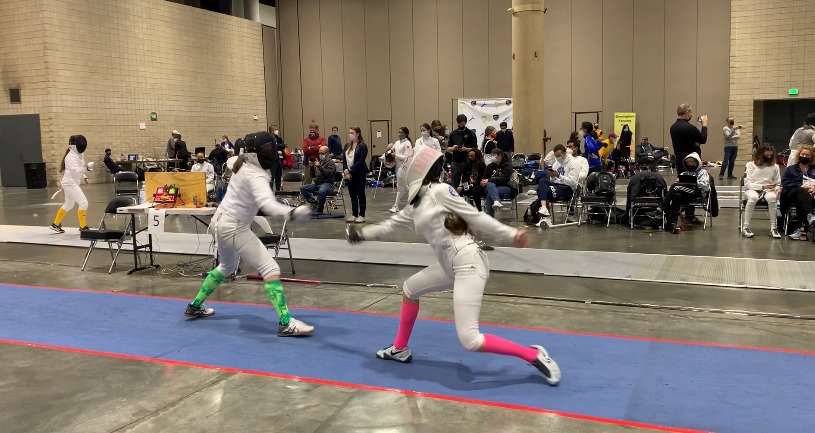Your First Fencing Competition: A Guide for Parents and New Competitors
So you’ve been training at T3 for a while, you’re getting comfortable with your footwork and bladework, and your coach thinks you’re ready to compete. Exciting! Your first fencing competition is a milestone moment that every fencer remembers. But what exactly happens at a fencing tournament? Whether you’re a nervous competitor or a parent trying to prepare, this guide will help you know exactly what to expect at your first fencing competition and set you up for success.
When Are You Ready for Your First Competition?
There’s no magic number of months or classes before your first fencing competition. Generally, fencers are ready when they:
- Understand basic fencing rules and right-of-way (for foil and saber)
- Can complete a full bout without major confusion
- Have consistent footwork fundamentals
- Know how to hook up to the electric scoring equipment
- Most importantly: WANT to compete and are excited (even if nervous) about the challenge
Your coach at Triple Threat will help you decide when the timing is right. Some fencers compete after just a few months, while others prefer more training time. Both approaches are perfectly fine!
Types of Fencing Tournaments
Local/Regional Tournaments These are perfect for your first fencing competition. They’re smaller, closer to home, and have a more relaxed atmosphere. Many offer Youth-8, Youth-10, Youth-12, and Youth-14 age categories as well as adult divisions.
Division Tournaments These are larger regional events sanctioned by USA Fencing. They’re more competitive and count toward national rankings.
North American Cups (NACs) & Junior Olympics These are national-level events. Most fencers work up to these after gaining experience at local and regional competitions. Check the USA Fencing national events calendar for upcoming tournaments.
Registration: Getting Started
- USA Fencing Membership: All competitors need a USA Fencing membership. There are different membership levels—ask your coach which is appropriate for your competition goals.
- Tournament Registration: Most tournaments use AskFRED.net for registration. Create an account, find your tournament, and register early! Popular tournaments fill up quickly.
- Check Requirements: Some tournaments have rating or point requirements. Make sure you’re eligible before registering.
First Fencing Competition Checklist: What to Bring
Fencing Gear (all must be in good condition):
- Weapon(s) with body cords – bring at least 2 weapons!
- Mask (properly rated—check your label)
- Lamé (for foil and saber)
- Jacket and knickers
- Underarm protector (plastron)
- Glove
- Fencing socks
- Fencing shoes (or clean athletic shoes)
Additional Items:
- Extra body cords (cords break—trust us, bring extras!)
- Electrical tape
- Small tool kit (screwdriver, Allen wrenches)
- Water bottle and snacks
- Folding chair (you’ll spend a lot of time waiting)
- Small first-aid kit
- Phone charger
- Cash (some vendors are cash-only)
- Spare clothes (you WILL sweat)
For Parents:
- Patience and a good book or laptop
- More snacks
- Tournament information (event number, pool assignments)
- Supportive attitude and quiet confidence
Need help with fencing gear requirements? T3 has resources to help you prepare.
Tournament Day: What to Expect at Your First Competition
Arrive Early Get there at least 30-45 minutes before check-in. You’ll need time to find parking (it can be crazy), set up your chair, get your gear organized, and let your fencer warm up.
Check-In and Weapon Check All fencers must check in and have their equipment inspected for safety. Make sure everything is working and properly rated. The equipment check can take time when events are large, so don’t wait until the last minute.
The Format
Most tournaments follow this pattern:
- Pools: You’ll fence everyone in your pool (usually 5-7 fencers) to 5 touches. These are shorter bouts designed to seed you for the next round.
- Direct Elimination (DE): Based on pool results, you’ll be seeded into a bracket. These bouts go to 15 touches (or 10 touches for some youth events). Lose and you’re eliminated; win and you advance!
Between Bouts: There’s often A LOT of waiting. This is normal. Stay hydrated, snack lightly, keep warm, and stay mentally focused. Many experienced fencers bring homework, books, or headphones.
Important Competition Etiquette
- Salute your opponent, the referee, and the audience at the start and end of each bout
- Respect the referee’s calls even when you disagree (argue respectfully if needed, but accept the final call)
- Shake hands after the bout regardless of the outcome
- Stay in your assigned area when you’re not fencing
- Keep your gear organized and be ready when your bout is called
- Support your teammates, cheer for them between your bouts
For Parents: How to Support Your Fencer at Their First Competition
DO:
- Stay positive and supportive
- Trust the coach’s guidance
- Celebrate effort and improvement, not just wins
- Help with logistics (food, water, gear management)
- Take photos/videos from appropriate areas
- Understand that losses are learning opportunities
DON’T:
- Coach from the sidelines (you have a coach for that)
- Show frustration with referees or your fencer’s performance
- Compare your fencer to others
- Expect perfection at their first competition
- Hover or create additional pressure
Remember: Your fencer can see and feel your reactions even from across the venue. Stay calm, confident, and supportive.
After the Competition
Regardless of results:
- Congratulate your fencer on competing
- Talk about what they learned
- Ask what they thought went well
- Discuss (gently) areas for improvement
- Let the coach provide technical feedback
Your first fencing competition is about experience, not medals. Even Olympic champions lost their first bouts!
Common First-Timer Concerns
“I’m going to lose all my bouts!” Maybe! Or maybe you’ll surprise yourself. Either way, every bout is a learning experience. The best fencers lose—a lot. It’s how you improve.
“What if my equipment breaks?” That’s why you bring backups! Also, there are usually vendors at larger tournaments, and teammates often help each other out.
“What if I don’t know the rules perfectly?” Referees are there to enforce rules. If you make a mistake, they’ll correct you. That’s how you learn. You can also review the official USA Fencing rules before your tournament.
“Will I look stupid?” Everyone at that tournament was a first-timer once. The fencing community is generally supportive and welcoming to new competitors.
Ready to Take the Strip?
Competing in fencing is challenging, exciting, and incredibly rewarding. It teaches resilience, sportsmanship, and competitive drive that extends far beyond the strip. Your first fencing competition might be nerve-wracking, but it’s also the beginning of an amazing journey.
Questions about preparing for competition? Talk to your coach at T3! We’re here to help you succeed—whether that means local recreational tournaments or national championship events. If you haven’t started training yet, sign up for a free trial class to begin your fencing journey.
Good luck, and remember: En garde!

